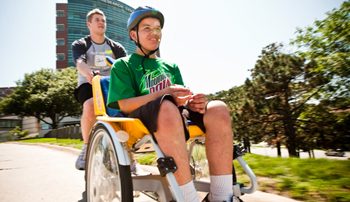 |
A panel discussion today in the College of Nursing, Cooper Auditorium, will focus on life with disabilities. The discussion is part of UNMC’s recognition of October as Disabilities Awareness Month. |
The panel discussion is part of UNMC’s recognition of October as Disability Awareness Month.
The panelists are:
- Kathy Hoell, Director of the Nebraska Statewide Independent Living Council;
- Mary Angus of Angus Disability Consulting; and
- Christi Crosby of Wellness Initiatives of Nebraska.
The discussion is presented by the Munroe-Meyer lnstitute for Genetics and Rehabilitation (MMI). The talk is sponsored by the UNMC Human Resources and the Employee Diversity Network.
Lunch will be provided to the first 40 attendees.
|
Doing it right
Jim was diagnosed with cystic fibrosis at three months old. Immediately his doctor asked his mother, “Where do you want your son to be in 20 years?”
As she thought about a future for a child with a disorder that, at the time, had an average life expectancy of 14 years, she said wanted her son to go to college.
Together, the physician and Jim’s mother planned for his future. They decided it was important that Jim be responsible for his own health care.
Throughout his childhood with support from family, school and health care providers, Jim learned to monitor his own health and learned skills to promote his wellness.
Now 24, married, employed and about to buy a home, Jim said he has been able to enjoy a full life with his cystic fibrosis, thanks in large part to a doctor who treated him as a person with a future, not just a disability.
Exercise opens doors — a first-person account
With a combination of autoimmune disorders, my body fights itself daily.
My wheelchair isn’t just helpful any more, it’s necessary. Its use means mobility but it also brought on weight gain that exacerbated my disability.
Even though I use a wheelchair, I adopted a healthier lifestyle tailored just for me.
I now eat carefully and exercise portion control, which helps me plan meals. I’ve found ways to exercise physically, too.
I’ve learned it doesn’t matter what your disability is, you can find ways to be more active.